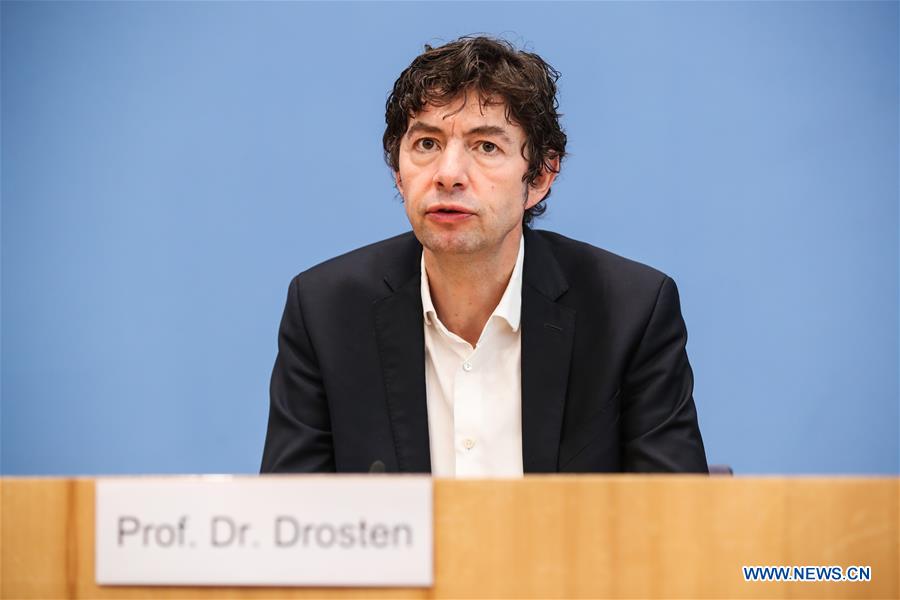
Director of the Institute of Virology at the Charite Berlin Christian Drosten attends a press conference briefing COVID-19 situation in Germany, in Berlin, capital of Germany, March 9, 2020. No fatalities have been recorded despite Germany reporting 1,112 confirmed COVID-19 cases as of 8 a.m. (0700 GMT) Monday, according to the country's disease control agency. (Xinhua/Shan Yuqi)
by Tian Ying
BERLIN, March 9 (Xinhua) -- No fatalities have been recorded despite Germany reporting 1,112 confirmed COVID-19 cases as of 8 a.m. (0700 GMT) Monday, according to the country's disease control agency.
The confirmed cases were recorded in 15 out of Germany's 16 federal states. The vast majority of cases nationwide are recorded in North Rhine-Westphalia following Baden-Wuerttemberg and Bavaria.
The risk level in Germany was set to "moderate" by the agency, the Robert Koch Institute (RKI) a week ago.
GOVERNMENT MEASURES
Germany has taken various measures, including cancelling several big trade fairs, to slow down the spread of the virus. In the meantime, the country is working at full speed to test and identify suspected cases, hospitalizing severe cases while quarantining mild ones at home.
"Everything has to be done to slow down and reduce the intensity of an infection wave that could build up in the next weeks or months," Lars Schaade, vice president of the RKI, told a press conference Tuesday.
There are three phases to slow down an epidemic outbreak: containment, protection, and mitigation. Germany is in containment phase and possibly even in mitigation already, German media Der Spiegel cited RKI President Lothar Wieler as saying.
On Wednesday, Federal Health Minister Jens Spahn first met with the leaders of the German health care system, followed by a meeting with his colleagues from various federal states. The aim of the talks was to coordinate joint efforts against the spread of the disease.
The governmental crisis unit to counteract COVID-19 set up on Feb. 27 banned the export of face masks and other medical protective equipment on Wednesday.
It also decided to procure protective equipment for medical practitioners, hospitals and federal authorities.
On Friday, Spahn exchanged views with the EU health ministers on the containment of the coronavirus and the supply of medicines during the pandemic.
On Sunday, the health minister recommended that events with over 1,000 participants be canceled due to the rapid spread of the coronavirus. The choice is up to federal states to decide whether to implement the policy.
He also advised German citizens against traveling to seriously-affected regions such as Germany's North Rhine-Westphalia and Italy.
Some public facilities such as schools and kindergartens were temporarily closed and major events have been cancelled or postponed, including the ITB Berlin travel trade show, Leipzig Book Fair and the Hannover Fair. The Bundesliga Games remains underway.
Since there is growing demand for disinfectants in pharmacies, the Federal Institute for Occupational Safety and Health announced on Wednesday an exception to an ordinance, allowing pharmacists to manufacture and sell hand disinfectants.
HOSPITAL RESPONSE
To date, there has been no fatalities due to COVID-19 in Germany. The first 16 patients, including 14 related tied to an automobile supplier Webasto in Bavaria and two from China, have been discharged from hospital after recovery.
Clemens-Martin Wendtner, chief physician of the infectious disease center of the Munich Schwabing Hospital that had treated nine of the 14 Bavarian patients, told Xinhua that the key to their successful treatment is early identification. A Chinese Webasto employee, the source of the first wave of infection, notified the company upon her diagnosis in China.
The most severe case was treated with the HIV drug Ritonavir and broad-spectrum anti-bacteria medicines.
More importantly, low-pressure single isolation rooms with mobile HEPA filters were also crucial to prevent the patients from being re-exposed to virus-borne air, according to Wendtner.
However, the successful treatment in an epidemic outbreak hinges largely on sufficient medical resources and their efficient deployment. As the number of infected cases continues to rise, mounting pressure on the German medical system is foreseeable.
Christoph Luebbert, head of the infectious diseases center of the Leipzig-based St. Georg hospital, told Xinhua that when the number of infected patients surges, asymptomatic and mild cases have to be quarantined at home. Most importantly, reliable diagnosis methods are needed, he said. (Zhang Yirong from Berlin and Zuo Wei from Frankfurt also contributed to the story)